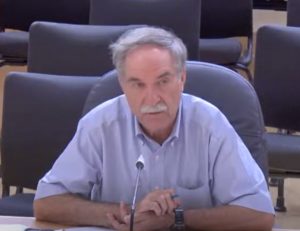
Dr. Robert Duncanson
CHATHAM- The Chatham Board of Health held a lengthy discussion on the quality and testing of groundwater in Chatham, and the concerns of PFAs in groundwater at their last meeting on August 16.
Chatham resident Deborah Ecker presented the board with a 2003 Source Water Assessment done by the Department of Environmental Protection (DEP), which found that 7/10 commercial properties, 3/4 industrial properties, and 3/14 miscellaneous properties were found to have hazardous levels of contaminants in groundwater.
Ecker proposed the board start a new study and make sure properties are compliant with water quality standards.
“The step I request is that you request the water and sewer department and the select board to undertake a far broader study than (what) is ongoing now about the uses with our water protection districts, which are known to be threatening,” said Ecker.
Ecker also drew out differences between Chatham’s zoning bylaws and the Cape Cod Commission’s bylaws for water prediction districts recommends.
“The point I’m making is that Chatham has a great deal at risk for its water quality because of its location of potentially toxic uses,” said Ecker.
Chatham Board of Health Chairman John Beckley said that water commissioners are directly responsible for taking action for source-water quality, but the board of health does have authority to become involved in any issue that has a direct impact on the health and safety of Chatham residents.
The Massachusetts Department of Environmental Protection implemented new regulations last October for the testing of Per- and polyfluoroalkyl (substances) PFAs in water.
“We want to make sure there’s enforcement, not just an issuance of what the standards are,” said Ecker.
Systems the size of Chatham are now required to start testing in April. Due to the new regulations, Chatham detected PFAs levels over the maximum contaminant level in well #5, which lead to the immediate shutdown of the well.
The source of the PFAs is still unknown.
Director of Health and Natural Resources Robert Duncanson said that drinking water is tested rigorously for contaminants under both state and federal drinking water acts.
“In terms of expanding that into a larger study of many other contaminants, that’s what the yearly testing and monitoring at all the public water supply wells is exactly designed to do,” said Duncanson.
“To monitor that for a broad range of contaminants so that you get a heads-up ahead of time if any of those contaminants are going to create problem.”
Duncanson added that testing reports are published every year in the Consumer Confidence Report.
“I think Chatham has done a very good job over the decades of protecting their public water supply wells,” said Duncanson.
Board members brought up concerns about drinking water with PFAs in it, and potential health risks if PFAs are consumed.
“The problem with PFAs is it’s considered a ‘forever chemical’ because it does not break down naturally,” said Duncanson.
“That’s why it creates such concern. Once it’s in the groundwater, it doesn’t dissipate over time naturally.”
Chatham draws its water from the Monomoy Lens, which one of six lenses lenses that make up the Cape Cod Sole Source Aquifer.
























